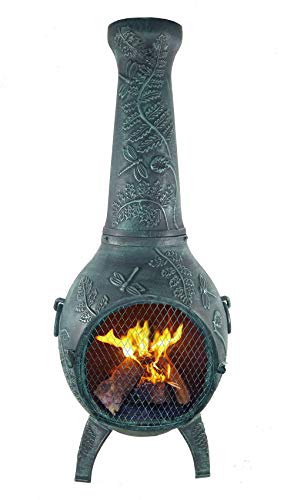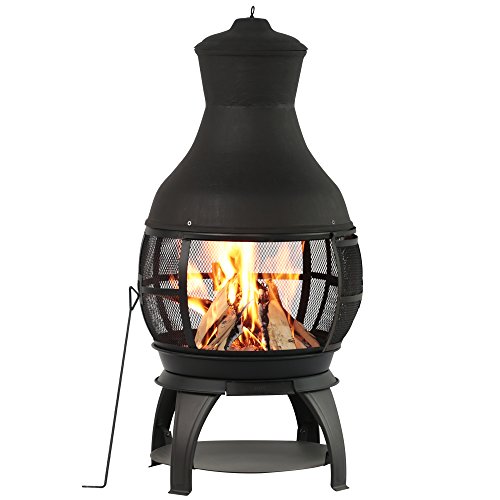Fire Pits & Chimineas Tools To Help You Manage Your Daily Life Fire Pi…
페이지 정보
작성자Ute Magoffin 댓글댓글 0건 조회조회 5회 작성일 24-09-20 12:48본문
 Chimineas Vs Fire Pits
Chimineas Vs Fire PitsChimineas are like pot-bellied stoves in that they have an opening on the front where fuel can be stacked, and an attached chimney that directs smoke upward. They can be found in a variety of materials, including clay or terracotta to give the traditional appearance and iron or cast iron for durability.
metal chiminea models are more durable and can withstand higher temperatures. Clay models require more care. Both add warmth and ambience to outdoor spaces.
Chimineas
Chimineas are like fireplaces in many ways, but they have a more decorative look and are designed specifically for outdoor use. They are constructed from clay or terracotta and may be decorated with bright themes inspired by Mexico. Modern chimineas are constructed out of cast iron and aluminum which are more resistant to cracks and deterioration than clay.
Originally a potbellied stove The chiminea was first developed in Mexico and other Western states. They are mostly used for entertainment however, they can also be a focal point in any outdoor space. The long chimney of a chiminea can direct smoke upwards, keeping it out of the reach of those who are seated near it. This is in contrast to fire pits that often have an open flame, which can spread sparks, embers, and other debris over the ground.
Both chimineas and fire pits, provide warmth to outdoor spaces. However, they are different in terms of maintenance and advantages. The aesthetics of the Chiminea can be adjusted to different styles of garden and the minimalist, sleek design of fire pits is ideal for a variety of outdoor spaces.
The different maintenance requirements for chimineas versus fire pits is largely due to the materials employed. Terra clay, terra cotta and cast iron are more susceptible to deterioration. This is why chimineas generally require more frequent maintenance than fire pits.
Both kinds of outdoor fire features are well-known to create a warm, inviting and welcoming place to gather with family and friends, for cocktails or dinners. The closed and enclosed design of a chiminea makes it suitable for smaller gatherings and can be more effective in warming up the area. The more prominent safety benefits come from the fact that it provides greater protection against sparks and embers which could fly off the fire, and fire pits & chimineas - look at this now - pits need to be carefully placed to reduce the risk and should be constantly supervised.
Fire pits
It is possible to choose whether you'd like to include a chiminea or a fire pits chimineas pit when planning your outdoor space. Both provide warmth and elegance to your garden or patio however they differ in terms of design operations, features, and security features. We'll help you select the best one for your space by examining the initial costs, maintenance cost, fuel costs and much more. We'll compare the heat output smoke, the safety and heat output of both.
A chiminea or chimenea (pronounced che-mehn-ee-yah) is a freestanding front-loading fireplace that includes an chimney and can be used to cook in. They can be made from clay, metals such as cast iron or steel, or cement or stone. They are available in various designs, shapes and sizes, giving versatility to fit different outdoor decors. Based on the material they are made of they can be insulated to provide additional comfort and a more contained flame, which helps reduce the chance of sparks flying off and promotes safe operation.
While chimineas are able to be used using charcoal or wood but it is best to make use of seasoned or kiln dried logs since moist wood emits more smoke and is less effective at heating. Chimineas require a bigger fire to keep warm, which may result in more smoke. This can be reduced by using log grates, ensuring proper airflow and maintaining the chiminea.
Fire pits can be built out of a variety of materials, with steel being the most well-known due to its durability and affordable. Some fire pits are portable while others are permanent fixtures. They are typically built into the ground or placed on elevated decks and are available in various shapes, sizes and finishes to complement the various outdoor decors. They can be powered by gas, providing an additional level of convenience and control or by charcoal and wood.
Although they may be less troublesome to maintain than chimineas but fire pits are considered to be more hazardous than chimineas. Their open design allows for more sparks that stray which could cause danger to children and pets. To prevent accidents, they should be placed away from flammable items and under constant supervision. They also create lots of smoke and ash, which can make them uncomfortable for certain people to sit near.
Safety
Chimineas and fire pits can add warmth and charm to an outdoor space However, using them can be risky. Both are extremely hot, which is why you should be cautious when using them, especially around animals and children. Both are suitable for surfaces that are prone to cracking when heated (see below) which is why putting the sand layer inside your chiminea or a brick and stone slab underneath the fire pit is advisable. Both are prone to releasing lots of smoke, which could be an issue for those who live in areas with high winds. The chiminea has the advantage of having the fire contained within it, meaning it is less prone to winds that blow ash and embers around. The opening is only on one side and it is difficult to see the back. It is easy to leave a chiminea in a safe place in a windy location.
Make sure you use only seasoned, kiln dried logs for all kinds of fireplaces. They will burn better and produce a lot less smoke. Be sure to stay clear of things that are flammable, such as paper, twigs and rubbish that could quickly erupt into flames and trigger an unwelcome or hazardous reaction.
Be aware of any local burning restrictions. They could be caused by adverse weather conditions that combine with high emissions to raise levels of fine particulate pollutants to dangerous levels. Inhaling these harmful toxins could cause respiratory problems.
Keep a bucket or garden sprinkler handy in case your fire starts to get out of control. Also, make sure that the area surrounding your fire pit is clear of branches, twigs and leaves that are prone to catch fire. It is also an ideal idea to have an emergency kit in the event of in case someone is injured by sparks or smoke. A chiminea and a fire pit can last for a long time provided they are maintained properly. However, terracotta and clay are more fragile than metal and could crack at high temperatures, so a cast iron fire pit or chiminea is a better option for a durable and long-lasting addition to your patio.
Maintenance
If your backyard fire pit or chiminea outdoor fireplace is not maintained properly, it can create dangers that are serious. It can cause serious damage or injuries if misused or placed too close to a house or shrub, or other structures. It is important to ensure that only natural materials such as wood are burned and that no plastics, trash or liquid fuels are allowed to be utilized. It is also important to check your local weather forecasts to comply with rules governing when you are allowed to burn. In the event of an emergency, it's a good idea keep a fire extinguisher or hose within reach.
A chiminea, a traditional outdoor wood-burning fire, adds warmth and ambience to gardens and patios. Made from clay, metal or cast iron, chimineas are available in a variety of styles and finishes. A lot of chimineas feature an intricate, traditional design that brings a rustic feeling to outdoor spaces. Chimineas also generate less smoke and particles than fire pits, making them more eco-friendly.
Cleaning your chiminea regularly will keep it in top condition. Start by clearing away any unburnt wood or ash from the inside of the grate. Then, you can start a small fire with a few pieces of kindling. After about an hour, carefully dowse it with water until it completely smothers the flames. Then, allow the chiminea to cool before making another fire with larger pieces of wood.
Chimineas can be a beautiful addition to your outdoor space but they require more maintenance than fire pits. To avoid rust and other damage caused by the elements, they must be cleaned regularly. Chimineas are also quite fragile and may break or crack if they are not handled with care.
The decision to purchase a chiminea, or a fire pit, ultimately depends on your personal preferences as well as your budget. Both options have advantages however, you must consider the initial cost and the long-term costs before choosing which is the best option for your home. If you're seeking a long-lasting solution, you can consider a custom-built chiminea or a fire pit made from robust materials like stone or steel and is able to withstand the rigors of frequent use and extreme weather conditions.

댓글목록
등록된 댓글이 없습니다.
